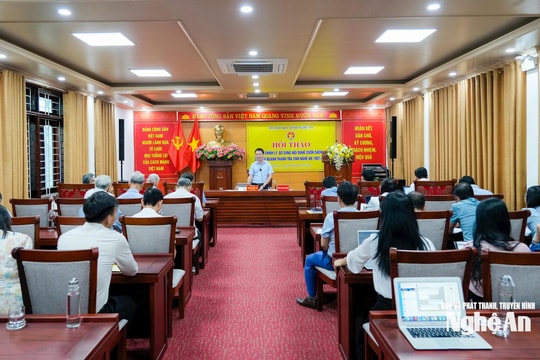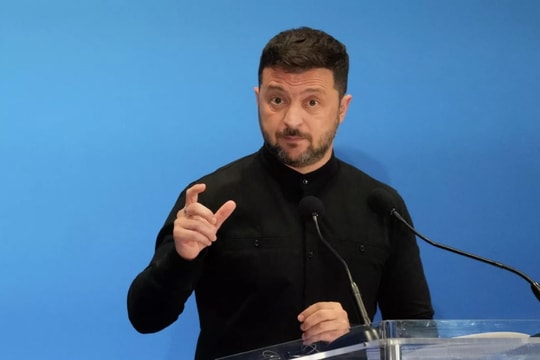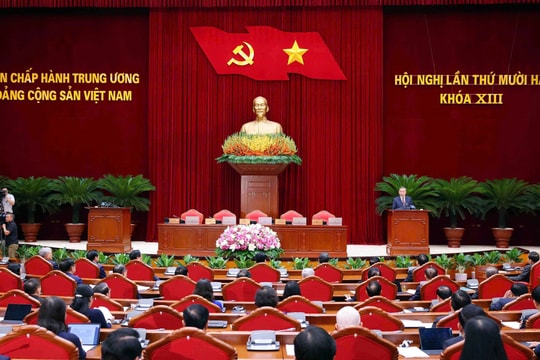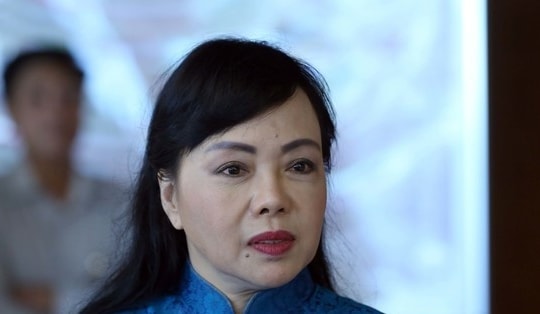Exemplary senior officials will have a positive impact on anti-corruption
After the 4th Central Conference of the 12th tenure, it is clear that some of the highest-ranking officials have set an example, creating a positive impact on the fight against corruption.
Degeneration has accumulated over 30 years of renovation.
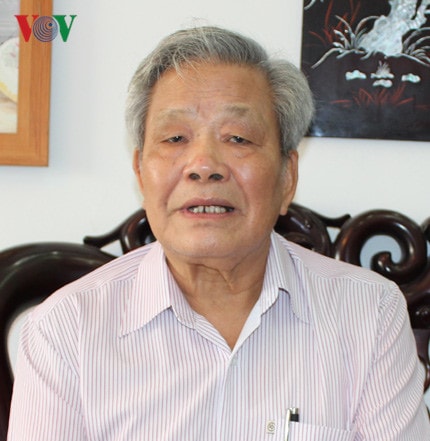 |
| Mr. Nguyen Tuc, Chairman of the Cultural and Social Advisory Council, Central Committee of the Vietnam Fatherland Front |
Speaking with VOV.VN reporter, Mr. Nguyen Tuc, Chairman of the Cultural - Social Advisory Council, Central Committee of the Vietnam Fatherland Front, said that to control power, state agencies alone are not enough, but must have people to supervise.
PV: There are opinions that if there are no deeper and more drastic solutions, the implementation of Resolution 4 of the 12th Central Committee will easily return to Resolution 4 of the 11th Central Committee, a good Resolution but not very effective when implemented. Do you agree with this opinion?
Mr. Nguyen Tuc: We must know that the problem of degeneration and corruption has accumulated since the beginning of the renovation process, when we accepted the development of a multi-sector economy according to a market mechanism under State management.
At the 6th Congress, our Party carried out renovation. By the 7th Congress, the Party recognized that some officials with power had degenerated and changed; by the 8th Congress, the Party identified that a number of Party officials with power had degenerated and changed. By the 9th Congress, a significant number of Party officials with power had degenerated and changed. By the 10th Congress, the draft Resolution had decided to remove the phrase “not small”, but after careful consideration, it was found that it could not be removed. By the 11th and 12th Congresses, the phrase “not small” had not been removed. Thus, it can be seen that our Party saw the problem of degeneration and change that had accumulated over 30 years of renovation.
I think that in the process of implementing the 4th Central Conference of the 11th tenure, our Party has done a lot of work, but due to the state of degeneration that has accumulated over many years, people feel that the work that has been done compared to the remaining work is not much.
In implementing the 4th Central Conference of the 11th tenure, our Party has alerted everyone that corruption and degeneration must be punished: Specifically, the Central Steering Committee on anti-corruption has brought 8 major cases to trial before the 12th National Congress of the Party; warned and implemented a series of measures at all levels, many degenerate cadres have had to leave the Party and be legally punished... I think that the initial steps in the recent past have shown that our Party has made great efforts, although they have not yet met the people's requirements. Public opinion wants to act more quickly, strongly and resolutely, especially from the top down.
After the 4th Central Conference of the 12th tenure, we can clearly see the exemplary behavior of some officials at the highest level creating a positive influence on the anti-corruption campaign.
PV: As you just said, it's not that we haven't done it yet, but that we haven't done it well enough. What do you think is the reason?
Mr. Nguyen Tuc: I still remember that our generation in the past also implemented Resolutions 72 and 228 of the Politburo and Secretariat on anti-corruption, but when summarizing, people still said "just hit from the shoulders down". Public opinion, people and party members want to do it from the top down, requiring the highest level to be exemplary, only then will the lower levels follow.
The actions of many top leaders recently, especially Prime Minister Nguyen Xuan Phuc, such as the Prime Minister's insistence on not changing cars; or the Prime Minister's direction requiring provinces and cities participating in local working delegations of Government leaders to not use more than 3 cars, Deputy Ministers and below, other members participating in the working delegation to use shared cars arranged by the Government Office; Such actions and directions by the head of the Government, although small, can be seen as a manifestation of learning from and following Uncle Ho.
People expect the top leaders to do the same, then subordinates will have to follow without being told.
I remember, in the past, 23 cadres who belonged to the Politburo and enjoyed Politburo standards such as Ton Duc Thang, Nguyen Luong Bang, Hoang Quoc Viet... they lived very exemplary lives, the State standards for these people, their wives and children were not allowed to touch. There were some members of the Politburo who were entitled to 8kg of meat, if not used up, they returned it to the State... Those actions had a great impact on public opinion at that time.
Although today's society is much different from the past, in my opinion, leaders and party members should still learn from Uncle Ho's way of life to set an example for their subordinates and for the people to look up to. Public opinion is upset because many officials use public funds for personal use too freely, while the country is still poor. Each society has its own rules, wartime or peacetime has its own rules. The rule in wartime is that everything is for the frontline, everything is for victory, the small ego must obey the self. But in today's society, if the self and the self are not harmoniously resolved, the country will not develop.
The root of the problem of degeneration comes from the fact that some leaders in power have put their ego above their own, using their own to serve their own interests. This is the consequence of the development of a multi-sector economy, the negative side of the market economy has had a huge impact. A large number of cadres and party members cannot maintain the qualities of communists who care for the people before caring for themselves, so the people are upset, and clean cadres and party members react.
It is true that although the Party has done a lot, it has not met the requirements, so people feel that they have not done much. Therefore, the implementation of Resolution 4 of the 12th Central Committee must be more drastic, stronger and broader to hope for effectiveness.
Accept to remove the "ulcer" so that the whole "body" can be healthy
PV: One of the reasons why the implementation of Resolution 4 of the 11th Central Committee has not been very effective is because we talk a lot but do not do much. What do you think about this comment?
Mr. Nguyen Tuc: I agree with the comment that the implementation of the Resolution of the 11th Central Committee, Session 4, has done many things but has not met the requirements, and many things have been talked about but not done much, and there are even things that have been talked about but not done. That is the obstacle that makes people and party members worried. It may also be due to objective circumstances but it is mainly due to the direction department.
People with a few scabs, if treated quickly and promptly, will not spread. That is to say, if there are no extremely strong measures, it will not be possible to fix it. In my opinion, we need to take drastic action, do it strongly, do it widely on a pilot basis and do it thoroughly, and not be afraid of not having people working because there have been opinions saying that if cadres are disciplined, who will work? I do not believe that. The people's intelligence and political awareness are now very high, not to mention the cadre team, our Party does not lack pure, exemplary and qualified cadres and party members. We need to accept losing a significant number of degraded cadres so that the whole "body" can be healthy.
PV: The Party's recognition of the signs of ideological, moral and lifestyle degradation of a number of cadres and Party members is considered quite fundamental. In your opinion, what solutions are needed to effectively prevent this situation?
Mr. Nguyen Tuc: In my opinion, this time the Central Committee has systematized the manifestations of self-transformation and self-evolution; systematized and concretized the manifestations of degeneration and change. That is basically enough.
At the 7th Congress, the Central Committee recognized that there were a number of corrupt party members and cadres concentrated in the fields of customs, police, and taxes; by the 8th Congress, it had spread to finance, banking, and land; by the 9th Congress, there were corrupt cadres in the central government, the Government Office, the Procuracy, and the Court; by the 10th Congress, it had spread more widely. Given this situation, it is necessary to specify, name and shame, but if it is not done resolutely, with a focus on key points, and strictly, it is easy to fall into a state of disorientation, which is what people call “beating the drum and abandoning the drumstick”.
In this 4th Central Resolution, the General Secretary has directly directed. But to help the General Secretary, in addition to the 6 key cases brought to trial from now until the end of the first quarter of 2017, the Central Committee needs to handle a number of cases at the provincial level so that it can create a widespread movement. If only a number of major cases are handled at the central level, people in the localities will think that corruption only occurs at the top. If a number of provincial cases are brought to trial in parallel with key cases at the central level, it will create an atmosphere of excitement among the people, so that people know that the central committee is doing the real thing, not just doing it for show, contributing to warning those individuals who still have corrupt, degenerate, and distant thoughts to restrain themselves. Those who have "dipped their toes in the mud" will have to voluntarily report. Many countries, including China, have done this, they kill both tigers and flies.
We can learn from this approach, working at both the central and local levels, from bottom to top, leaving no room for corrupt individuals to exist.
Must arouse the strength and patriotism of the people.
PV: Reality shows that no one dares to criticize those in power, causing the degradation of a number of cadres and party members to become increasingly serious. In your opinion, what solutions can control power?
Mr. Nguyen Tuc: Those who speak on the radio and write in newspapers to criticize corruption are mostly retired cadres and party members. To control power, state agencies alone are not enough, but must have people to supervise. I remember Uncle Ho once advised the police force: "Even if there are fifty or seventy thousand police, it is still very little compared to the people's force. We must have tens of millions of eyes and ears, and pairs of hands."
In the fight against corruption, we have not mobilized the people's strength. Ministers of Public Security from Mai Chi Tho, Bui Thien Ngo, to Le Minh Huong have all affirmed that 93-95% of major cases are discovered by the people, then journalists get involved and bring them to light, only then does the police start investigating.
I have talked about this issue many times, because we have not mobilized the people. If we can mobilize the people to participate in the fight against corruption, the results will certainly be much better. Corruption then brings it back to the residential area where we live. The changes they make in the residential area cannot be hidden from the people.
I think our weakest point in leadership and direction is not being able to arouse the strength and patriotism of the people. If we can do this, the negative aspects among the people will also be limited.
In summary, we need to pay attention to three points: First, leaders at all levels must set an example and implement correctly. Second, there must be a mechanism for supervision. Third, we must mobilize the people to participate, arouse the strength and patriotism of the people as well as the people's dissatisfaction with the current degeneration and degeneration. Combining all three of the above factors creates a new comprehensive strength to solve the problem.
PV: Thank you sir./.
According to VOV

